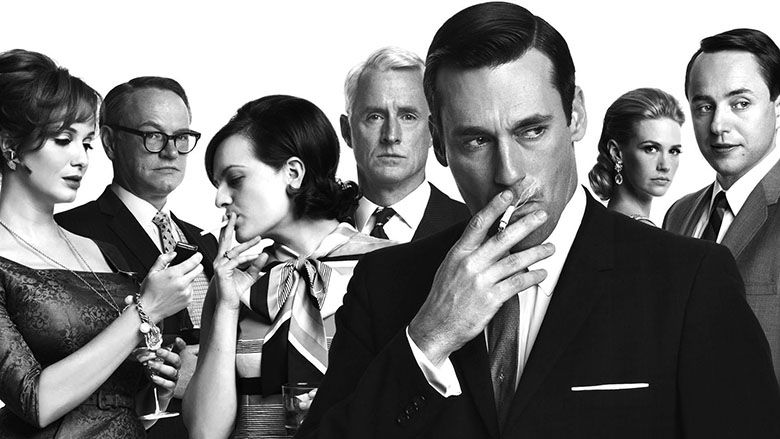After seven seasons over the course of eight years, AMC’s award-winning series, “Mad Men” has closed its doors. In a show filled with just about every vice and human failing known to man (and woman) all woven into the fabric of almost every character, I did not expect so many tidy endings to so many untidy lives.
Adultery and double dealing were the modus operandi of almost all the characters, and I can’t help but think the pain and collateral damage those “choices” generated had a lot to do with the series’ appeal with most television critics. Television like “Mad Men” seems to garner critical acclaim in direct correlation to how far it diverges from traditional moral standards.
There are plenty of moral bypasses in all good literature, but what makes the neo-modern view as seen in “Mad Men” less appealing — to me anyway — is the stipulation on the part of the creators of shows like this, of a complete disbelief in objective truth.
Bad and morally dubious as the characters are, the writing and acting and overall production values were brilliant. These characters, so good at selling products and finding the heart of the matter when it came to touching something deep inside consumers, were almost unilaterally unable to navigate their personal lives with any semblance of success.
Of course, the producers of the show sought to gather the largest audiences possible so modern day “Mad Men” could sell the products on AMC that modern day consumers think they have to possess … and perpetual motion has been achieved.
Don Draper, the main character, is an artificial creation. That’s not the character’s real name, his “real” identity or his true, “real” essence. Finally unable to put a positive spin on his fake existence, Don hits the road in search of meaning.
It’s about as crooked a road as the path we have seen this character take for seven years. He is a character incapable of fidelity, his pursuit of the deadening effects of alcohol have finally begun to pay the negative dividends that they always pay out, and when he finally has that breakdown we have all been expecting — in the midst of a hippie commune — I foolishly thought they may have given this very interesting character a very interesting “road to Damascus” moment. They didn’t.
What we got instead was a man who — although he makes a call and delivers a sincere if imperfect “confession” to his protégé, Peggy, itemizing his failings as if he actually was in a confessional — is still consumed with himself.
The resulting implosion that leaves him a trembling mess on the ground is “redeemed” when he starts navel gazing and practicing transcendental meditation on a hilltop overlooking the Pacific. I know the smile on Don’s face is supposed to indicate some kind of inner peace, but as a viewer I didn’t get the same sense of self-realization.
Peggy, the second most interesting character in the series, went from mousy secretary to mid-level executive but was continually frustrated by hitting her head on a Plexiglass ceiling. Yet, she has all of her professional angst washed away with a declaration of true love. Roger, the ad man born with the golden spoon in his mouth, who never suffers from all his indiscretions either in the bedroom or the boardroom, rides off into the sunset with another man’s wife and all is well.
Betty, Don Draper’s first wife — well, not exactly his first wife, but that is inside baseball only true devotees of this series would care about — has finally found her course in life … which happens to be hurtling toward its soon-to-be-end via the lung cancer the character was diagnosed with. The “growth” the producers of “Mad Men” see in this character speaks volumes. They see Betty finally taking control of her life as a good thing, even though she is aiming straight for the ground.
This was such a brilliant show on so many levels, yet it was so disturbing when it came to a philosophical worldview. If there was a character who didn’t look out for only themselves then I must have missed that episode.
If I may mix entertainment metaphors, recently there has been a lot of chatter about the new “Avengers” movie, with references to Nietzschean models of dualism and the pursuit of power.
“Mad Men” is nothing if not a treatise on the ubermensch. Don Draper assumes another man’s identity and even his destiny, turning himself into a titan of the advertising industry in the biggest, baddest urban jungle man has ever devised.
The producers of “Mad Men” freed Don Draper from the bonds and restrictions of an unseen God, spending seven years having him disregard just about all of the Ten Commandments. It’s interesting that they understood this would eventually cause a catastrophic crisis of emptiness in this character.
More interesting, and sadly revealing, is how they chose to resolve it. The show’s answer for Don’s existential crisis started out strong, with a wandering in the wilderness followed by confession, but then it detoured, as a show with so much deference for human autonomy must, and instead of looking upward for the answer, Don Draper looked inward — where all of his problems started in the first place.

